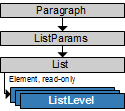ListLevel Object (IListLevel Interface)
This object provides access to the parameters of one level of a list. It is an element of the List collection. It provides access to the formatting and numbering attributes of the list level, but not to recognized text of the level.
Properties
| Name | Type | Description |
|---|---|---|
| Application | Engine, read-only | Returns the Engine object. |
| Main attributes | ||
| TemplateText | BSTR |
Specifies the template text of the list level. The text may include elements %0, %1, ..., %n, where n is the index of the current level. When viewing the document, these elements will be replaced with actual values. "%%" is used for the normal character "%". The other elements are displayed as is. For example, "Section %0.%1" means that the numbering of the second list level uses the current numbering of the first list level. |
| LevelIndex | int, read-only | Stores the index of the level. The value of this property is in range from 0 to 9. |
| NumberingStyle | NumberingStyleEnum | Specifies the numbering style of the list level. |
| Numbering attributes | ||
| BulletSymbol | BSTR |
Contains the bullet of the unordered list level. The property only makes sense, if the value of the NumberingStyle property is NS_Bullet. The value of this property always contains no more than one symbol. By default, the bullet symbol is ● (U+2022). |
| StartNumber | int | Specifies the start number of the list level. The value of this property is nonnegative. The non-numeric elements are counted from 1. |
| RestartNumberingOnUpperListLevelOccurrence | int |
Specifies the upper level of the list. If this level appears in the list, the numbering in the next appearance of the current level should be restarted. By default, the value of this property is -1, which means that the numbering is not restarted. |
Related objects

Output parameter
This object is the output parameter of the Item, AddNew methods of the List object.
See also
07.11.2025 12:48:30